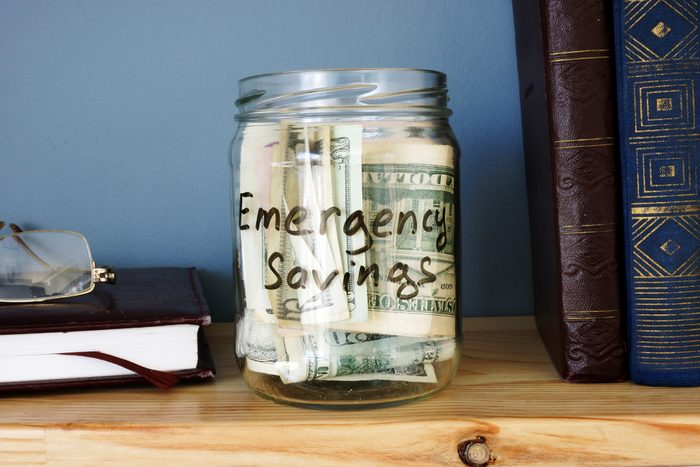
Wish you could retire early?
If you’ve ever dreamed of quitting your job so you could travel, spend more time with your family or just live life on your own terms, you’re not alone. A recent survey found that only 14% of people want to wait until age 61 or older to retire, and 41% would like to retire before age 45. Early retirement—anything before the official age of 66 or 67—might seem impossible, but proponents of the FIRE movement say it can be done.
While achieving this goal may require a more ambitious retirement-savings timeline or moving to a lower-cost state, other tips from the FIRE movement are a lot simpler—and easy to implement right now. Here’s what you need to know.
What is the FIRE movement?
The FIRE movement stands for Financial Independence, Retire Early. It advocates amassing enough of a nest egg—by aggressively maximizing income, slashing expenses, and saving and investing the surplus—so that at an early age, you can live off your savings and not have to work. The amount you need depends on your annual expenses, not your age, and uses the following formula: annual expenses x 25.
Let’s say you spend $50,000 a year. Your FIRE number (the amount you need to retire) is 50,000 x 25 = $1,250,000. The formula is based on the “4% rule,” the amount of savings you can withdraw each year, adjusted for inflation. However, there is room for flexibility. If you cut expenses in half, for example, you only have to save half as much.
“The math for this stuff is pretty foolproof,” says Pete Adeney, one of the pioneers of the FIRE movement and founder of the popular blog Mr. Money Mustache. “If you spend less than you earn, you will start amassing a nice surplus. Then if you invest this money, it will grow even faster. Most people who start down this path end up with a dramatically better money situation pretty quickly.”
Below, we share money-saving tips from real people who have managed to drive down their numbers and retire early, without living austerely. Follow along, and you may soon be doing more than dreaming about the best places to retire.
Get Reader’s Digest’s Read Up newsletter for humor, cleaning, travel, tech and fun facts all week long.

Track your spending
“It’s impossible to make better decisions with your money if you don’t know where it’s going,” says Steve Adcock, who retired at age 35 from a career in information technology and now blogs about building wealth. “You might not have realized you were spending $1,000 a month on clothes. Or perhaps you were going out to eat more than you thought.” To better understand your spending, he recommends using either a spreadsheet or a budget app like Mint or YNAB.
Michael Powers, a certified financial planner whose firm, Manuka Financial, has helped numerous people achieve FIRE, notes that while these apps are great for some people, others “are not going to pay attention unless they write down every expense.” The key? Figure out what works for you so that you stick with it.

Take a Marie Kondo approach to money
Once you’ve figured out where your money is going, the next step is to assess whether the things you spend money on truly bring you joy. The nomadic blogger known as Purple, who retired from her marketing career at age 30, asks, “Did that restaurant meal feel worth $250 of my blood, sweat and tears at the office? Could I make the same dish at home for a quarter of the cost with a lot more friends there to enjoy it in a more chill environment that I actually preferred? [If my answer was yes,] I kept that in my budget. [But when the answer was no,] I eliminated those things from my life and tried to be as intentional as I could about how I spent my money and my time.”
This is one of the primary mindset shifts that Adeney has long promoted. “Every purchase is a choice,” he says, “between having this new thing right now or increasing your wealth and freedom for the rest of your life, starting right now.”

Slash your expenses
Once you know what your expenses are, see where you can make cuts. “Why are you paying for cable when Netflix will do? Why are you spending $100 on a Verizon cell phone bill when you can get Mint for $15?” asks Diania Merriam, who retired from a career in brand extension and licensing at age 33. She now runs an annual “three-day party about money” called the EconoMe Conference, as well as hosts a personal-finance podcast.
Like this woman who saved $13,000 in one year, Merriam also recommends evaluating recurring expenses, like car and home insurance, every month, to see if there’s a better deal out there. “The gap between your income and expenses is actually a lot more important than your income alone,” she says. “If there’s no gap, there’s no way to build wealth or get out of debt or do anything with your money.”

Focus on housing, transportation and food
“Those are the three big areas where people spend the most money,” Merriam says, so if you can make significant cuts in those areas, “you almost don’t have to worry about the rest of it.” Adeney notes that our society’s “maximum car dependence” is a big obstacle for many, and he advocates using a bicycle or public transportation whenever possible. “Cars really do wreck pretty much everything about modern life—health, money and social connections,” he says, “which means every mile of driving that you can subtract from your regular routine will bring you more of these great things.”
Matt R., who retired at age 50 after working in a variety of industries in the Richmond, Virginia, area, says that rather than ditching his car, his approach is to buy used cars, drive them for a really long time and make any necessary repairs himself. Cars are just one of the things money experts tend to buy cheap.

Move to an area with a lower cost of living
“The biggest thing I did to get my expenses down was to move from Manhattan to Seattle,” says Purple. “The difference in cost of living between those two places allowed me to have an even better and fancier life in Seattle for about half the price of New York City.” She acknowledges that this FIRE movement method isn’t an option for everyone—it was hard to do without family or a job waiting for her when she got there. Find out if rent in big cities is one of the things that’s expected to be cheaper in 2023.

Don’t carry debt
Carrying debt—especially from credit cards—is one of the top retirement mistakes you can make. “There is nothing that destroys wealth quite like credit card debt,” says Adcock. “Credit card debts are high interest and hard to eliminate for a lot of people.” In fact, he suggests using credit cards only when they provide benefits like travel miles and extended warranties—and only if you can do so responsibly. But never carry a balance on them, he advises.
If you already have debt, Merriam, who eliminated $30,000 of debt in 11 months, recommends paying off the highest-interest debts first. An online debt-payment calculator can help you stay on track.

Start saving as early and aggressively as you can
This is a retirement fact you need to take seriously: While traditional financial advisers recommend saving 10% to 20% of your income, FIRE movement advocates aim for anywhere between 25% and 75%. “What I typically see is a 30% or 40%-plus savings rate,” Powers says. “It’s much easier to save when you’re younger, especially if you’re single, before you have other responsibilities and obligations that may make it harder to save.” Plus, he adds, the earlier you start, the more the compounding works in your favor.

Invest the surplus
The stock market can feel intimidating to first-time investors, but it doesn’t have to be. “The key to understanding investing is to memorize the following silly but valuable oversimplification: The market always goes up,” says Adeney. “And then a second, more concrete rule: Buy [index funds] … rather than betting on individual stocks. Yes, [the market] will fluctuate wildly, with 200% gains and 50% drops every now and then, but these don’t affect a lifetime investor one bit.”
In addition to index funds, Adcock recommends Roth IRA plans, which grow tax-free. “This means you won’t be responsible for paying taxes when you withdraw this money in retirement,” he explains. Plus, many employers offer these plans, so you can use payroll deductions to make the process easy and painless.
Powers acknowledges that this is a good strategy for many people, but cautions that it depends on your income tax bracket. “If you’re in a top bracket now but expect to be in a much lower one in the future, you probably should convert it later [to a Roth] at a lower tax rate.”

Start an emergency fund
“It’s the number one step to building wealth,” Adcock says. In fact, it’s one of the most common personal finance tips that’s never taught—and even more important than investing. He recommends keeping enough money to cover at least three months (and Powers recommends up to six months) of living expenses in an account separate from your primary checking, so you dip into it only when an unexpected expense arises—say, your furnace dies or you lose your job. This will prevent the temptation of relying on credit cards.
To get started with this FIRE movement tip, Adcock suggests automating monthly transfers from your checking to your savings account. “Even if you can only transfer $50 a month, that’s fine,” he says. “The key is to start building that rainy day fund now.”

Take advantage of free stuff
Many big-ticket expenses are covered, fully or partially by employers and even the government. “Free education is one of the best ways to ramp up your earnings potential,” says Matt R. He initially scored a free college education through his enrollment in the ROTC, and later got a free master’s degree thanks to his employer’s tuition reimbursement program. Many employers also match contributions to 401K retirement plans and health savings accounts (HSAs). Matt also notes that if you buy health insurance through the Affordable Care Act—the best option for many retirees—tax subsidies that lower the price are based on your income, not your assets.
Pro retirement tip: Don’t forget that you can also get free stuff on Amazon.

Develop a side hustle
Adcock notes on his blog that this is a great way to boost the income side of the equation fast. But Merriam notes it’s not for everyone. “When I quit my job, I created a list of 14 streams of income I wanted to explore. The podcast was my first side hustle,” she says. “But I don’t think a side hustle is a necessity; it depends on your level of income from your W-2 job” and whether it’s something you have the passion, time and energy for. If you do, here are five easy ways to make extra income.

Job hop
You have the most leverage to negotiate a new salary when you’re getting a new job. “I could have made so much more money if I would have hopped around every two to three years,” Merriam says. Powers cautions that while that’s great advice for some people, it depends on your individual circumstances. For example, he says, if you’re in a sales role and you have a nonsolicit or noncompete agreement, and you can’t take those relationships with you, you may struggle to make more money. Also, in a recession, you may not want to be the most recent employee from a job-security standpoint. But if it works for you, here’s how to search for a job while you have one.

Don’t compare yourself with other people
“In our consumer-oriented society, we’re comparing ourselves to the Kardashians,” says Merriam. “If we don’t have a mansion or a great car, we feel deprived.” Matt R. agrees, saying, “You can have all that stuff, but you have to continue working to pay for that. We don’t have the latest and greatest anything. I’m rockin’ an iPhone 7. I’m going to keep it going till it dies.”

Know when to relax about money
Like dieters who develop an unhealthy attitude toward food, the same can happen when you focus a lot of your attention on money. “Because I grew up in the condition of a money shortage, and I love optimizing so much, the habits persisted even when I had more than enough money to let loose,” Adeney says, emphasizing that it’s important to learn the difference between “frugal” and “cheap.”
“Cheapness affects others and makes them uncomfortable, so you should be extra generous in this department,” he says. “A healthy frugality, on the other hand, might involve deciding to build your own deck even though you know it is hard work, because you want the challenge and the skill building it will bring. And then the $5,000 you’ll save for a week of work is just icing on the cake.”

Realize this is not your father’s retirement
Retirement in the 21st century looks very different than it did in the past. “The FIRE movement is not about not working,” Merriam says. “For me, FIRE is about separating your finances from your work. It’s about having more autonomy over your time, what you do for work, who you work with. My only paid work is eight hours a week on the podcast. I don’t make any money off the conference. It’s about being able to choose how you want to contribute to the world without a lot of concern over the money part of it.” For some people that includes volunteering.
Powers says some people experience a loss of identity when they’re no longer working a traditional 9–5 job, so he advises taking time to think that through, especially if you’re on the younger side. “You’re going to be healthy for another 30 to 50 years. What are you going to do with all that time?”
Sources:
- Real Research Media: “Survey Reveals Majority Wish to Retire Below 45”
- Forbes: “What Is the 4% Rule for Retirement Withdrawals?”
- Pete Adeney, a pioneer of the FIRE movement and the founder of Mr. Money Mustache
- Steve Adcock, blogger
- Michael Powers, a certified financial planner in Richmond, Virginia, and the founder of Manuka Financial
- Purple, blogger
- Diania Merriam, founder of the EconoMe Conference and host of a personal-finance podcast
